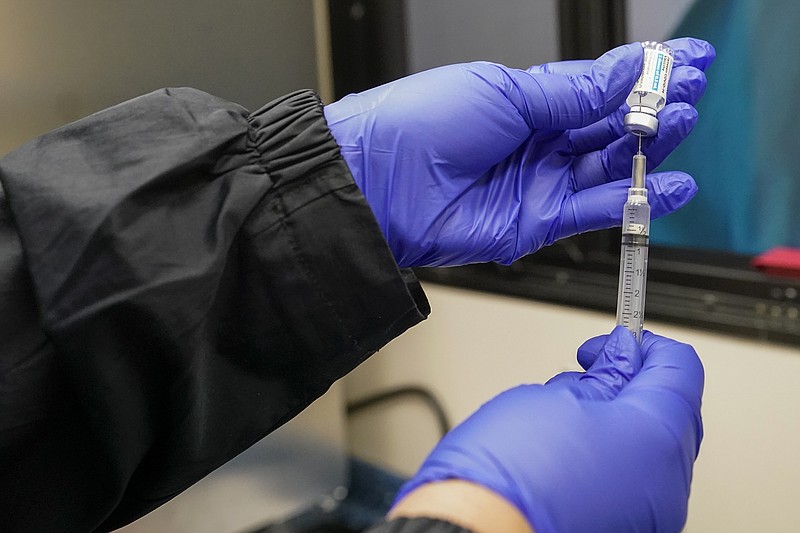Going into its second week of operation, the Cole County Community COVID vaccination site in Jefferson City had more vaccines than customers the past week.
However, health officials said they are pleased with how the site has worked for those seeking to be vaccinated.
During a briefing at Tuesday's Cole County Commission meeting, Cole County Health Department Director Kristi Campbell said what they are seeing at the site at Capital Mall is happening all across the state.
"Last week when we opened, we had 4,000 doses of the Pfizer vaccine, and we ended up giving about 1,600," Campbell said. "Our biggest day was Tuesday when we did 800 vaccinations. I think some of the reason for the dropoff is vaccine hesitancy.
"People heard about the health effects others were seeing after getting vaccinated, and that has kept some people from getting them."
According to figures from the Missouri Department of Health and Senior Services, as of Tuesday, 278,971 vaccine doses have been administered in the past seven days in Missouri, averaging 39,853 per day.
Since vaccinations became available in January, 41,953 people have received the first dose of vaccine and 18,390 have gotten both in Cole County, health officials said Tuesday. For the state, DHSS figures showed 2,119,815 people have gotten the first dose of vaccine and 1,451,316 have gotten both doses.
Any Missouri resident 16 and older can receive a COVID-19 vaccination at the Cole County site, which is located where Party City had been on the south side of Capital Mall.
"I know Miller County health officials are no longer doing clinics at their health department and are directing people to our site if they want to get vaccinated," Campbell said. "A lot of other local counties aren't ordering vaccine anymore and will probably direct them up here."
Cole County officials would like people to make appointments to get vaccinated at the site, which is open 9 a.m.-3:30 p.m. Mondays through Thursdays. However, Campbell said, the site would take walk-ins as well.
"It's going to be a little confusing when we do a second dose, so we are emphasizing that people coming next week will be getting the last of their prime doses of the Pfizer vaccine," Campbell said. "The second doses will be done three weeks later."
The vaccination site is a collaborative partnership between the Cole County Commission, Cole County Health Department, Capital Region Medical Center, Community Health Center of Central Missouri, Jefferson City Medical Group, SSM-St. Mary's Health Center and Missouri National Guard.
To make an appointment at the site, visit covidvaccine.mo.gov/navigator/ and register through the COVID-19 Vaccine Navigator provided by the Missouri Department of Health and Senior Services. If you don't have internet or computer access, you can call 1-877-435-8411 to register and schedule an appointment.
Campbell said she's had a lot of positive comments about how fast people are able to get in and out.
"We had a 98-year-old lady who came in on the first day who didn't have a computer to get registered for an appointment, and we were able to get her registered and vaccinated," Campbell said. "It takes eight to 10 minutes to complete."
The site is scheduled to be open through July 30.
Campbell also reported they have worked with Aging Best, an Area Agency on Aging, to get people older than 65 to get vaccines delivered to the home bound and the Cole County EMS has gone out to 30 homes to administer vaccinations.
On another COVID-related discussion, commissioners said they are getting inquiries about what the county might be doing with federal COVID-19 relief with the American Rescue Plan Act. President Joe Biden signed the bill in March, which included $65.1 billion in direct aid to every county in America.
They have yet to receive an official confirmation of an amount, but the National Association of Counties estimated Cole County will receive $14.8 million.
Eastern District Commissioner Jeff Hoelscher said water districts and private organizations who lost out on money because they couldn't hold events due to the pandemic have been reaching out to him. Western District Commissioner Harry Otto recently attended a meeting where he heard a presentation from a county commissioner in Kentucky who said they were planning to use their share of funds to hook up every home in their county with fiberoptic cable.
Cole County Auditor Kristen Berhorst said they are still waiting for guidance from the federal government.
The U.S. Department of the Treasury will oversee and administer the payments to state and local governments, and every county will be eligible to receive a direct allocation, according to NACO.
"We want to make sure we know what is allowable and what isn't," Berhorst said. "We are still estimating that the first of the two checks we are to get will come around May 10. The second check could be adjusted based on where our 2020 census population figures come in. The first check is based on the 2010 census numbers."
Otto noted under the current plan, all relief funds must be spent by Dec. 31, 2024.
"If you wanted to do some major infrastructure improvements, it's going to be difficult to get those planned and completed," Otto said.

